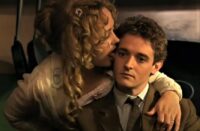On the streets around and outside Paris, the groups of the lawless motorbikers pulling high-octane stunts at daring speeds and often with stolen gear are well known for their “rodeos.” No ropes and horses, no chaps and spurs—just petrol, rubber, and steel. They gather in groups, taunt and ride, share their best stunts on social media and on the down-low, plan their next heist. A jury prize winner at Cannes last year, director-writer Lola Quivoron’s film Rodeo takes an ethnographic approach to the scene, getting up close and personal with a young, brash woman beguiled by, and gaining entry to, the rough-and-tough world of the bikers and their colorful, action-packed subculture.
It’s a fascinating approach, a modern French take on the social-problem film aimed at deconstructing gender roles. A version of The Wild One by a feminist filmmaker with a documentary, neo-realist approach, if you will. The protagonist, Julia (Julie Ledru), is fiercely independent, kowtowing to no one. She has practically no family and few friends, but she knows how to ride and dreams of getting better. She can ride, fix, and even steal, scamming condescending men who think a woman interested in their used motorbikes is just a benign novelty. She pilfers their bikes from under them without a care for the consequences and rides away with a fiery middle finger aimed back at her stunned dupes.
Despite her knowledge of bikes and ability to snatch them away from unsuspecting sellers, she’s not accepted by the gang she wants to join, a group of high-flying young men whose “rodeos” are occasions for showing off their skills. These aren’t exactly faux Fast-and-Furious-style stunts choreographed and CGI-ed for maximum effect but simply-captured and still-astonishing jumps and wheelies performed by talented young riders with no protective gear nor visible safety precautions. (The stunts are credited to Bourne and Mission: Impossible veteran Mathieu Lardot). While Rodeo doesn’t devote all that much of its screentime to the singular event that gives the film its title, the magic these young athletes can perform with their machines is nonetheless spectacular.
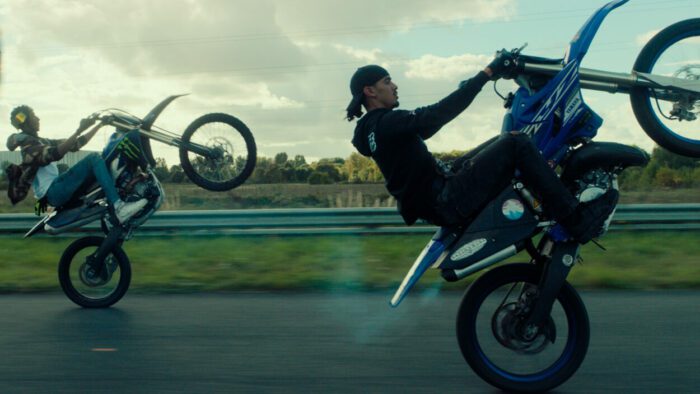
Eager to join the group, Julia gets her chance with a brief friendship with a talented rider named Clark (Dave Nsaman). While he’s willing to show her the ropes, he’s not around for long, and the rest of the group is a volatile powder-keg of toxic masculinity and fierce rivalries, one less than willing to accept a female into their fold. She adopts a code-name: “Unknown,” like a man with no name. To prove herself requires more than merely riding a motorbike. She’s assigned some rites of passage—performing low-level cons, running drug errands, and more for the group’s incarcerated ring leader, Domino—but the further she ascends, the more enemies she makes.
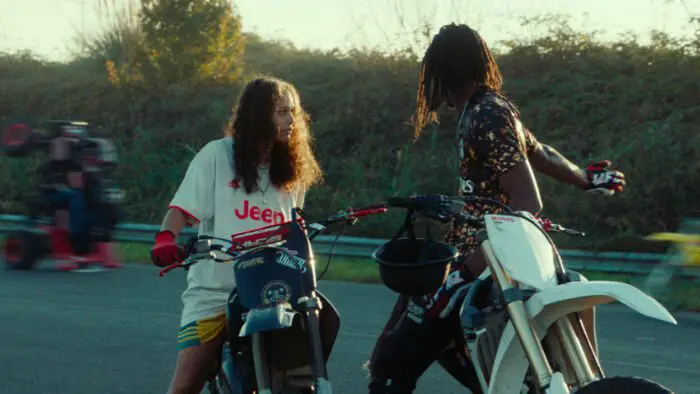
All of the scenes that have Julia at odds with the gang, fiercely protecting herself and further ingratiating herself into the fold, crackle with energy. Quivoron scripts and shoots these with a low-key, documentary-style approach and the cast is largely comprised of nonprofessional actors, but none of that slows the narrative as Julia heads deeper and deeper into a complicated, risky heist. A biker whom Quivoron found through Instagram, Ledru is a newcomer to film whose unconventional looks and intent gaze work to the film’s advantage, imbuing her Julia with a fiery spirit you can’t help but admire, even when you’re questioning her decision-making.
What slows the film down, though, is a subplot involving gang leader Dom’s wife, Ophélie (Antonia Buresi, who co-wrote the script) and son, with whom Julia stays while biding her time. It’s clear that aside from the risks she takes with the gang and her desperate need to feel a part of something larger than herself, Julia needs love. But her developing feelings for her newfound family seem to come out of the blue and go nowhere in particular, other than to put even more of a target on her back. Rodeo revs up when the riders are on the scene with Julia and stalls out when they’re not.
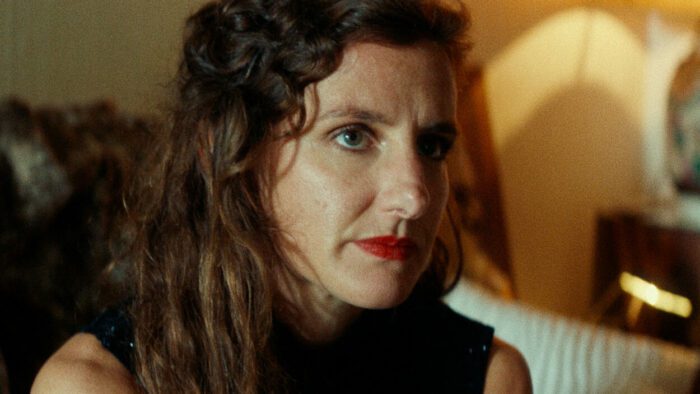
The big heist is a complex, daring undertaking: cinematically, it harks all the way back to the Westerns of the classical era, with a Yakima-Canutt-as-John-Wayne leaping from one steed to the next. There’s little planning involved, but no lack of daring. Does it make sense that the tensions between Julie and a rival reach a toxic pitch at the exact moment the heist requires their utmost concentration and focus? No, not really, nor does the film’s ending, which abandons the rest of Rodeo‘s verité-style approach for something more expressionistic. For a film that rigorously avoids anything that does not feel or seem a part of its documentary approach, the climax is shot in a way that seems almost diametrically opposed to all that has gone before, as if someone had mandated a sudden and unanticipated change. It’s not better and it’s not worse, but it surely and oddly is completely different from the rest of the film.
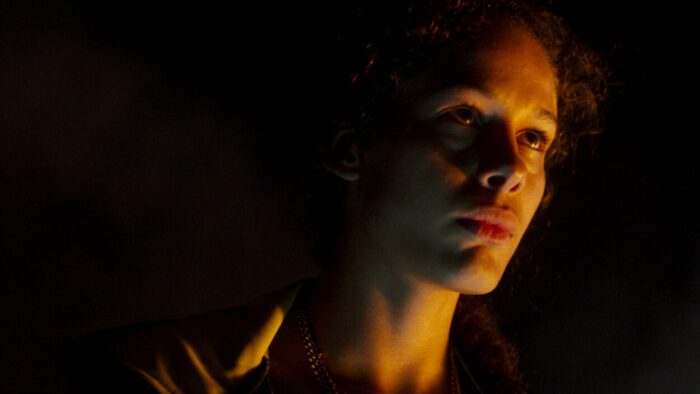
It’s Quivoron’s more anthropological approach, the one on display throughout the film up to its conclusion, that works best. The director grew up near Paris, where she first the motorbikers roaring past her house, eventually meeting them and making the short thesis film on the subject Au loin, Baltimore. Quivoron’s been and shooting and interviewing the bikers since 2015.
That time spend in the riders’ company gives her an insider’s keen eye, and Rodeo works best as an extended exploration of a subculture few are privileged to know. Having an outsider as a protagonist work her way in allows Quivoron to gain access, ask questions, and learn the ropes. It may not yield a perfectly conclusive narrative with its ends wrapped in a bow, but it nonetheless makes her Rodeo a fascinating way to spend 100 or so minutes without scraping your knees or breaking your neck. And it makes both Quivoron and Ledru as women to watch in the future, whatever paths their stories take.
Rodeo, directed by Lola Quivoron and starring Julie Ledru, debuts in select North American theaters March 17, 2023. 144 minutes, in French, with English subtitles.


